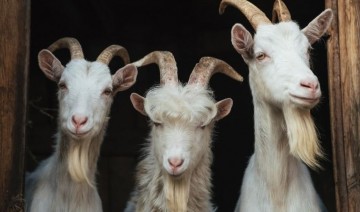
Goat Care 101
Goats can be amazing – and amusing! – additions to a backyard hobby farm or urban homestead. But do you know how to care for goats properly? Understanding the basics of goat care is essential to ensure healthy, productive animals that will live long, happy lives.
Why Keep Goats?
Goats are economical and versatile animals. Depending on the breed, goats can be productive for…
- Milk – Not just for drinking, but also for making lotions, soaps, or cheese
- Meat – Either when older goats become less productive or when breeding goats
- Fiber – To be woven into yarn or dyed for specialty products
- Manure – For fertilizing gardens, flowerbeds, or even to sell as fertilizer
- Weed Control – As goats eat a wide variety of plants in the landscape and pasture
Furthermore, goats are also fine companion animals. They can be loyal, playful pets, and also serve as great company for other livestock that may be anxious if kept alone. Keeping goats can be a great lesson for children, and a rewarding pastime for adults.
What Goats Need
It is important to be properly prepared for keeping goats. First, check local laws and ordinances about farm animals and livestock to be sure goats are permitted, or if any license fees, breed specifications, or herd limits may apply. Once you know you can have goats on your property, these feisty animals will need…
- Adequate Space – Goats are smaller than many other types of livestock, but still require plenty of room to explore and roam. Outdoors, each goat will need 200-300 square feet of space, while indoor shelters should provide 20-30 square feet of space per goat. Larger herds will naturally require greater space to prevent territorial conflicts and aggression.
- Secure Shelter – Goats don’t like to be wet, and a comfortable shelter is necessary to protect them from rain and snow. The shelter should have proper ventilation, dry bedding, and should also serve as a windbreak or to conserve heat in winter. Depending on the climate, a shelter may be as simple as a lean-to, or may need to be a more secure barn or shed.
- Sturdy Fencing – These animals are well known as escape artists, and secure fencing is a must for keeping goats. Fences should be at least 4-5 feet high, and there should be no trees, shrubbery, or structures close enough that goats could jump over the fence. Electric fences are often preferred, and any goat fence should be a no-climb design.
- Pasture – Goats will graze frequently and a large pasture is necessary for them to explore and forage. Clover and mixed grasses are the best components of a goat pasture, but because these animals will eat nearly anything, it is important to remove any potentially toxic or poisonous plants from the pasture. The pasture should also be well-drained and free of muddy areas.
- Feed – Most goats will not get a proper diet or adequate nutrition from grazing alone, and supplemental hay or grain is necessary. Herbs can also be added to a goat’s diet for more nutritional balance, and mineral blocks or loose minerals can be provided to help keep goats healthy.
- Water – Goats may not be picky eaters, but they can be picky drinkers. Plenty of cool, fresh, clean water should be available at all times, and watering troughs should be cleaned regularly to minimize the risk of bacteria or other contaminants. In cold winter areas, heated troughs may be necessary to keep water liquid and drinkable even below freezing.
- Exercise – These agile, active animals require plenty of exercise to stay healthy and nimble. Climbing areas such as a play structure or pile of rocks, wood stumps, or hay bales can be great exercise for goats, and can easily be rearranged to keep the animals occupied. Goats can also be trained to pull small carts or can even be leash-trained for regular walks.
- Entertainment – Goats are curious, intelligent animals that may find ways to get into mischief if they don’t have enough entertainment. Exercise can help entertain goats, and it is a good idea to provide toys such as balls or tunnels for goats to explore. Treat toys are also good options, and moving goats to different locations now and then can help keep them amused.
- Veterinary Care – All animals need regular veterinary care, and a veterinarian should have goat experience to deal with these quirky animals. Goats will need regular vaccinations, hoof trimming, deworming, and other health care to stay in top condition and peak productivity throughout their lives.
Before You Get Goats
Once you understand what goats need, it is still a good idea to do further research on specific goat breeds and their unique requirements. If possible, visit other goat keepers, farms, or petting zoos to learn about different goats and get hands-on experience with their needs and personalities before committing to your own herd, and you’ll be better prepared for proper goat care.
Above all, stay alert to your goats at all times. The more familiar you are with your animals, the faster you will be able to note any health or behavioral concerns and make the proper changes to keep your goats healthy, happy, and well-adjusted as fun members of your four-legged family.
